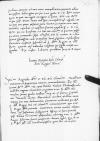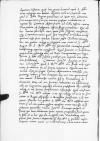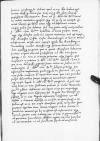List #2314
Ioannes DANTISCUS do Bona SforzaHeilsberg (Lidzbark Warmiński), 1540-05-05
Regest polski:
Dantyszek dziękuje królowej Bonie za opowiedzenie się po stronie jego i kapituły warmińskiej wobec króla [Zygmunta I] w konflikcie z Aleksandrem Scultetim. Rezultatem wstawiennictwa królowej był nakaz królewski, by Sculteti osobiście stawił się przed urzędem instygatora w dniu 24 maja. Dantyszek prosi o dalsze wsparcie, tak by, niezależnie od obecności lub absencji pozwanego, instygator rozpoczął przeciwko niemu postępowanie na podstawie zeznań świadków. Podkreśla szkodliwość działań Scultetiego zarówno dla diecezji, jak i dla stosunków w kapitule katedralnej.
Dantyszek dementuje informacje, jakoby miał uzurpować sobie nienależną biskupowi władzę nad klasztorami w podległych mu miastach. Klasztory są wyludnione, w Wartenburgu jest zaledwie dwóch franciszkanów [konwentualnych], w dodatku słabego zdrowia, nie zaś, jak twierdzą donosiciele, czternastu lub piętnastu zakonników różnych reguł, w tym ośmiu rzekomo narzuconych przez Dantyszka.
Dantyszek wyjaśnia, że przydał owym dwóm nie uciekinierów i odstępców, a dobrych i pobożnych wyznawców reguły świętego Franciszka [obserwantów] wygnanych z ziemi miśnieńskiej przez luteranów. Uczynił to przez wzgląd na niedostatek kapłanów w swoich włościach oraz obszerność niewykorzystanych budynków klasztornych. Urządził to tak, by jedni i drudzy żyli według własnej reguły i podlegali własnym przełożonym, dzieląc tylko jałmużnę i stół.
By uwolnić się od fałszywych oskarżeń usilnie prosi, by królowa zleciła wizytację klasztorów franciszkańskich w Braniewie i Wartenburgu np. podskarbiemu pruskiemu Stanisławowi Kostce.
Rękopiśmienne podstawy źródłowe:
| ||||||||||
Tekst + aparat krytyczny + komentarzZwykły tekstTekst + komentarzTekst + aparat krytyczny
Serenissima Reginalis Maiestas et Domina, domina clementissima.
Humillimam orationum et servitiorum meorum commendationem.
Ex cf.  BJ, 6657, f. 388v
clementer testetur, quod hoc genus hominum apud S(erenissimam) or S(acram)⌈S(erenissimam)S(erenissimam) or S(acram)⌉ Maiestatem Vestram refugium non habeat, dignetur mihi et
BJ, 6657, f. 388v
clementer testetur, quod hoc genus hominum apud S(erenissimam) or S(acram)⌈S(erenissimam)S(erenissimam) or S(acram)⌉ Maiestatem Vestram refugium non habeat, dignetur mihi et
Ceterum, Serenissima Regina et domina mea clementissima, quod S(erenissima) or S(acra)⌈S(erenissima)S(erenissima) or S(acra)⌉ Reginalis Maiestas Vestra scribi mihi iussit certo se edoctam me ad
Verum, Serenissima Princeps, quisquis is fuerit, qui hanc delationem fecit, revera praepostere fecit, cum in praesenti et in hoc ipso die in oppido meo  BJ, 6657, f. 389r
fratrum, cuiuscumque sit ordinis, apud et cum illis duobus agit. Tantum ms. Tuntum(!)
⌈TantumTantum ms. Tuntum(!)
⌉ abest, quod
BJ, 6657, f. 389r
fratrum, cuiuscumque sit ordinis, apud et cum illis duobus agit. Tantum ms. Tuntum(!)
⌈TantumTantum ms. Tuntum(!)
⌉ abest, quod
Quod vero viros bonos et vitae sanctimonia probatos iis duobus Wartenbergensibus addere destinaram, eos, inquam, viros, qui non perfugae neque religionis erant desertores, sed regulae  BJ, 6657, f. 389v
cooper<a>tores haberent; sicque cum illis duobus egeram, ut ipsi in sua regula et alii in sua viverent suisque quivis illorum praepositis oboedirent, eleemosinae tantummodo cum convictu et mensa omnibus essent communes. Si ob id merui adeo inique deferri, Dei iudicio relinquo.
BJ, 6657, f. 389v
cooper<a>tores haberent; sicque cum illis duobus egeram, ut ipsi in sua regula et alii in sua viverent suisque quivis illorum praepositis oboedirent, eleemosinae tantummodo cum convictu et mensa omnibus essent communes. Si ob id merui adeo inique deferri, Dei iudicio relinquo.
Haec sunt, Serenissima Regina et Domina, domina mea clementissima, quae ad tuendam innocentiam meam me ipsa rei aequitas et veritas scribere compulit. Ea, ut S(erenissima) or S(acra)⌈S(erenissima)S(erenissima) or S(acra)⌉ Maiestas Vestra Reginalis clementer apud se expendere, boni consulere, et si quid gravioris suspicionis de me conceperit, in auras refundere dignetur, quantum possum humilius et impensius oro meque illi supplicissime commendo a Deoque Omnipotente Serenissimae Maiestati Vestrae Reginali aetatem diutissime florentem et prosperrimam faustaque iucunda et grata omnia precor ex animo.



